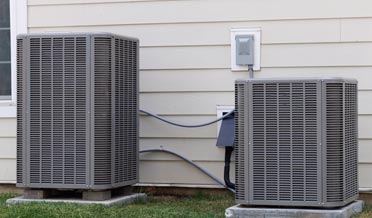AC System Frozen? Let the AC Repair Experts Handle It
A serious AC Repair problem sometimes develops with air conditioners where the coils and copper pipes in the system develop a thick coat of ice and cease to function properly. The air passing through the air conditioner is not cool anymore, even though ice is present. Understanding how this ice develops may explain the science behind this unusual phenomenon.
Why Does AC Work?
Compressing a gas increases the temperature of the gas and, conversely, releasing the pressure cools the gas. Engineers use this principle to successfully cool spaces. Gas is enclosed in a closed system and the gas is compressed and released rapidly and repeatedly. Warm, moist air is brought across the network of tubes in the evaporator coil.
The air becomes cool, and the gas absorbs the heat and transports it outside. This compression/release process requires a precise amount of gas and airflow to accomplish the cooling tasks. When an imbalance occurs, the moisture from the air collects on the coil and develops ice. Imbalances include:
Inadequate Airflow. Normally, a large amount of air passes over the coil and moisture condenses on the tubes of the coil. Rapid airflow contributes to this water dropping to the collection pan underneath the coil and a tube carries the water to the house’s drain system.
When the airflow is diminished, the moisture stays on the evaporator coil long enough to freeze (see Low Refrigerant Gas below). Once this ice begins to freeze, the existing ice continues to collect moisture until the entire coil is enveloped in ice. What causes diminished airflow?
- The air filter traps dust, pollen, and dander immediately before the air encounters the evaporator coil. With each cycle, the filter continues to collect dust and the filter needs to be changed at least every three months. If the filter is not changed, it can collect so much dust and pollen that it inhibits the airflow across the evaporator coil.
- Obstacles in the ductwork can reduce the airflow and create this problem. A damper that reduces and redirects airflow can reduce airflow and may need to be opened. Check return air plenums—usually one or two per floor—and supply vents. Cover duct openings can significantly reduce airflow.
- An old or poorly functioning blower motor can cause reduced airflow and lead to the development of ice on the coils.
Inadequate Refrigerant Gas. We often call the gas used in air conditioners by the inexact term “Freon.” A very precise amount of Freon is kept in a closed system; compressions per hour and compression rate are all very precise. An AC Repair problem develops when some of that gas leaks out of the closed system.
- The compressor cannot detect the amount of gas but continues to compress the gas to a certain metric. A lower amount of gas compressed at the same rate will get hotter when compressed and colder when released. When the charge is correct, the gas cools to about 380 F, but when some of the gas has leaked away, the gas cools below 320 F. Now the moisture is very apt to freeze on the coil.
- It is not unusual for the “freezing” to travel from the evaporator to the condenser coil outdoors. That is a lot of freezing!
All this freezing, but no cool air for the home. If your air conditioner is putting out warm air or you observe ice on air conditioner components, what should you do?
- First, turn the thermostat setting from Cold to Off and turn the Fan setting from Automatic to On. This stops the cooling cycle but continues to draw warm air across the iced coil. It may take several hours for the ice to melt, so don’t expect the air conditioner to function for a while.
- When the ice melts anticipate the drain pan to be overwhelmed. Be prepared to collect or mop up the overflow.
- Call your AC Repair technician. Scheduling a visit may take time, so get the scheduling process underway.
- Check your air filter and replace it if necessary. Investigate dampers, vents, and return air plenums to ensure adequate airflow.
- Be patient. Solutions are available, but it will take time.
Need an AC Repair Contractor? We can help!
Contact our AC Repair team at Doctor Cool & Professor Heat today at 281-338-8751 or email Doctor Cool and let our professional Residential AC Repair technicians assist with all of your AC services.
